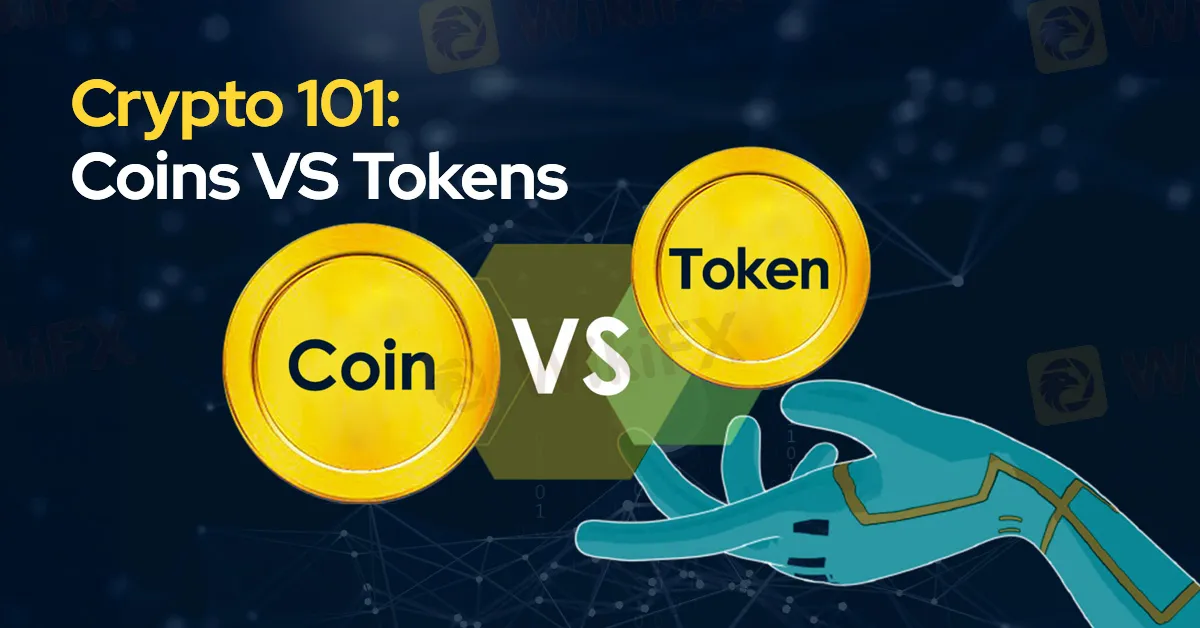简体中文
繁體中文
English
Pусский
日本語
ภาษาไทย
Tiếng Việt
Bahasa Indonesia
Español
हिन्दी
Filippiiniläinen
Français
Deutsch
Português
Türkçe
한국어
العربية
Crypto 101: Coins vs Tokens
Abstract:For those new to the world of cryptocurrency, terms like "coin" and "token" may seem interchangeable. However, understanding the distinction between these two digital assets is crucial for navigating the crypto landscape. Both coins and tokens serve as integral components of blockchain ecosystems, yet they differ in their functionalities, use cases, and the technologies underpinning them.

For those new to the world of cryptocurrency, terms like “coin” and “token” may seem interchangeable. However, understanding the distinction between these two digital assets is crucial for navigating the crypto landscape. Both coins and tokens serve as integral components of blockchain ecosystems, yet they differ in their functionalities, use cases, and the technologies underpinning them.

Coins are native to their respective blockchains and function primarily as a digital currency. Bitcoin, for example, operates on its own blockchain, and its primary purpose is to act as a decentralised peer-to-peer payment system. Similarly, Ether (ETH) is the native coin of the Ethereum blockchain, designed to power smart contracts and decentralised applications (dApps).
A defining feature of coins is their ability to serve as a medium of exchange, a store of value, and, in some cases, a unit of account. Their primary function often mirrors that of traditional currency, albeit in a decentralised form. Coins are typically used for transactions, mining rewards, and staking, depending on the blockchain's consensus mechanism.
Moreover, coins are intrinsic to the security and operation of their blockchains. For instance, miners or validators receive coins as rewards for confirming transactions and maintaining the network's integrity.

Tokens, on the other hand, are built on existing blockchains and do not have their own independent networks. For instance, most tokens are created on platforms like Ethereum, using standards such as ERC-20 or ERC-721. Unlike coins, tokens represent assets or utilities rather than acting purely as a medium of exchange.
Tokens can be categorised into various types, including:
- Utility Tokens: These provide access to specific services or features within a blockchain ecosystem. For example, Filecoin tokens allow users to pay for decentralised storage services.
- Security Tokens: Represent ownership in an underlying asset, such as stocks or real estate, and are subject to regulatory oversight.
- Non-Fungible Tokens (NFTs): Unique tokens that represent ownership of a specific digital or physical item, such as art, music, or virtual real estate.
The creation of tokens is more accessible than building a coin since tokens rely on pre-existing blockchain infrastructure. This simplicity has contributed to the proliferation of tokens in decentralised finance (DeFi) projects, initial coin offerings (ICOs), and gaming platforms.

For traders and investors, understanding the distinction between coins and tokens can help clarify the value proposition of different crypto assets. Coins often signify a long-term investment in the success of a blockchain ecosystem, while tokens can represent a more speculative interest in specific projects or applications.
Additionally, the use cases for tokens and coins differ significantly. While coins like Bitcoin are primarily used for transferring value, tokens often have specialised functionalities tied to the ecosystem they operate in. Recognising these differences can guide strategic decisions, whether youre diversifying a portfolio or evaluating a new project.
In summary, coins and tokens are essential components of the cryptocurrency ecosystem, each playing a unique role. For budding traders, understanding these differences is the first step toward making informed decisions in a rapidly evolving market. By grasping their functionalities and potential applications, you can navigate the crypto space with greater confidence and clarity.

Disclaimer:
The views in this article only represent the author's personal views, and do not constitute investment advice on this platform. This platform does not guarantee the accuracy, completeness and timeliness of the information in the article, and will not be liable for any loss caused by the use of or reliance on the information in the article.
Read more

WikiFX Review: Is IVY Markets Reliable?
IVY Markets, established in 2018, positions itself as a global brokerage offering a diverse range of trading instruments, including Forex, Commodities, Cryptocurrencies, and Stocks. The platform provides two primary account types—Standard and PRO—with a minimum deposit requirement of $50 and leverage up to 1:400.

Germany's Election: Immigration, Economy & Political Tensions Take Centre Stage
Germany is set to hold a crucial general election on 23 February 2025, with voter frustration over migration emerging as a dominant issue.

ED Exposed US Warned Crypto Scam ”Bit Connect”
The Indian Enforcement Directorate (ED) recently exposed a crypto Scam from a firm called Bitconnect. During the investigation, which took place on February 11th and 15th, 2025. The authority recovered bitcoin worth approximately Rs 1,646 crore & Rs 13.50 Lakh in cash, a Lexus car, and digital devices. This investigation was conducted under the provisions of the Prevention of Money Laundering Act (PMLA) of 2002.

XTB Secures Chilean License, Expands Latin America Footprint
XTB gains a securities agent license in Chile, boosting its Latin America presence. The broker plans to offer stocks, ETFs, and derivatives to local investors.
WikiFX Broker
Latest News
Pi Network Mainnet Launch: Game-Changer or Crypto Controversy?
GlobTFX Users Report Same Issue! But Why?
Rate Cut or Not? It Depends on Trump’s Policies
eToro Adds ADX Stocks to Platform for Global Investors
Why Do You Keep Blowing Accounts or Making Losses?
B2BROKER Launches PrimeXM XCore Support for Brokers
Germany's Election: Immigration, Economy & Political Tensions Take Centre Stage
WikiFX Review: Is IVY Markets Reliable?
WikiFX Community Creator Growth Camp
Effect of Tariffs on Gold and Oil Prices
Currency Calculator






